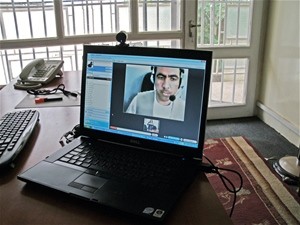
Electrical service in southern Afghanistan is a high priority for USAID
USAID/IRP
Electrical service in southern Afghanistan is a high priority for USAID
15 SEPTEMBER 2010 | KANDAHAR, AFGHANISTAN
In April 2010, a truck laden with explosives crashed into a guesthouse occupied by project staff supporting USAID in Kandahar City. The ensuing explosion also threatened a program that is critically important to USAID’s Afghanistan Infrastructure and Rehabilitation Program (AIRP) and the effort to provide stable electricity to the people of Kandahar and surrounding areas.
“All of the expats were evacuated,” said AIRP’s Kandahar Diesel Power Plant Manager, a native of Kandahar City. “For two or three weeks, we were totally on our own with no technical advice. Yet the plant must still run.” Afghan trainees stepped into the breach, keeping the generators operating to supply power to five cities and more than 94,000 families.
Prior to the attack, Afghan trainees received one-on-one training, much of it to learn to repair damaged generators and overhaul equipment. Now they had to learn to manage and to report daily assessments of electrical service.
“Everybody’s role changed,” said the Plant Manager. “The former finance trainee had to learn to be a diesel mechanic. An equipment operator is working as a manager.”
When the first technical advisor returned to Afghanistan after the attack, he could not go back to Kandahar. “We had been expanding the Afghan staff,” he said. “Suddenly, we went from spending an enormous amount of time working with them to nothing.”
Using a laptop video camera and voice-over-internet protocol, the advisor in Kabul and the Afghan staff in Kandahar set up an on-line “shadowing operation.” Training and support proceeded virtually.
In Kandahar, the USAID model of capacity building succeeded. Afghan workers took over and delivered greatly needed resources to improve people’s lives and to pave the way for Afghan leadership.







Comment
Make a general inquiry or suggest an improvement.